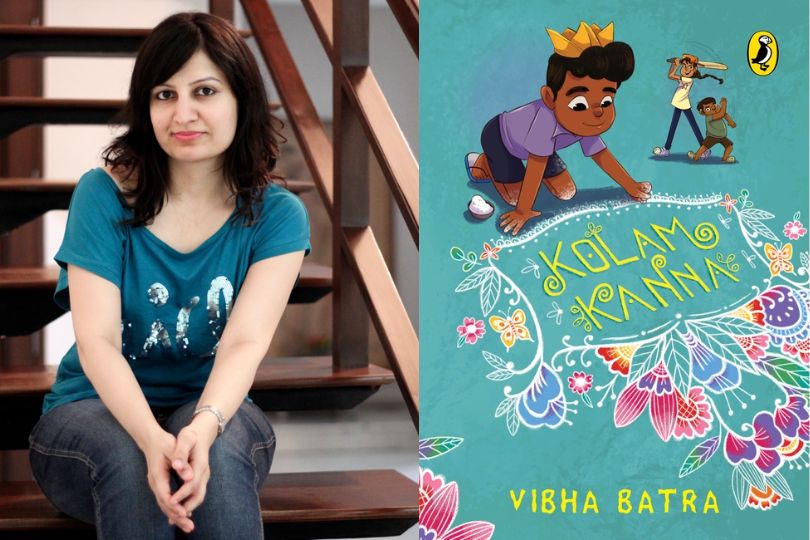Interview with Vibha Batra, Author of “Kolam Kanna”
Discover an exclusive interview with Vibha Batra, the author of 'Kolam Kanna,' on Frontlist—a captivating literary conversation.on Nov 07, 2023

Vibha Batra (born 28 November) is a Chennai-based Indian author, advertising consultant, poet, lyricist, translator, travel writer, playwright, and columnist. Punjabi by descent, Vibha was born and raised in Kolkata and later moved to Chennai many years ago.
She is a copywriter by profession who has several books to her credit including a Tongue in Cheek, a collection of poetry, and A Twist of Lime, a collection of short stories. Vibha has also contributed poems and short stories to various anthologies.
Frontlist: Your book features a unique and compelling storyline, particularly where Bharathi, a non-resident, strives to enter the competition. Could you share where you drew inspiration for this plot? Did it stem from real-life events or experiences, or was it purely a product of your imagination?
Vibha Batra: Thanks so much for the lovely words! No real-life events or experiences to blame, I’m afraid! Kolam Kanna came purely from my imagination. That’s cue to insert a disclaimer: This is a work of fiction. No family members, relatives, friends, colleagues, acquaintances were harmed during the making of this book. Also, I love kolams! Am absolutely fascinated by this traditional art form and am in complete awe of the brilliant artists who create gorgeous pieces of art every single day.
Frontlist: In your book, you've portrayed Bharathi, a male character, engaging in kolam-making, traditionally considered a practice more associated with women. Can you share your motivations behind choosing a male protagonist for this role? Were you aiming to convey a message about challenging or redefining gender roles through this character and his actions in the story?
Vibha: Choose the protagonist? It was the other way round! Bharathi strolled into my head and refused to leave till I wrote his story. After all, art and creativity and imagination are at the heart of self-expression; they belong to everyone, regardless of who they are, where they come from, what they look like.
Frontlist: The book touches on sensitive issues like class disparity and gender bias. How did you approach weaving these themes into the story for young readers? Also, what do you think about how these issues can deeply impact such communities mentally?
Vibha: My approach while writing a story for young (as well as young-at-heart) readers remains the same: write it as honestly, as authentically as I can, without making it preachy or boring. An engaging, relatable, fun-to-read (and write!) story or a heavy-handed attempt to educate, drive home a message, and impart moral values? Option A, any day, please.
Frontlist: The story portrays strong friendships between the characters. How do you believe such positive relationships can impact young readers' understanding of social inclusion and empathy?
Vibha: It’s lovely to read about people who’re like us. It’s lovely to read about people who aren’t like us. What better way to broaden our horizons, to make exciting new discoveries about people, places, things, to bridge gaps and divides, to promote understanding, to be more accepting of those who are different from us.
Frontlist: In your book, Bharathi makes a plan and disobeys the rules to participate in the competition. This raises an interesting question about whether breaking the rules to pursue something you deserve or want is fair or justifiable. Could you share your perspective on this theme and how it relates to the choices and actions of the characters in your story?
Vibha: Interesting question! Here’s what I think: No jumping red lights. Rule. Must be followed. No stealing, lying, cheating. Rule. Must be followed. Denying a deserving kolam artist the opportunity to participate in a contest because of their background. Rule? Must it be followed? So, the real question is, is the thing in question even a rule? Does it help, support, protect, empower everyone? Or does it favor only a select few? Does it maintain socio-economic hierarchies, perpetuating discrimination and exclusion? Can defying an unfair, unjust practice be termed breaking a rule? Should one zip up and obey so-called rules? What about our responsibilities towards ourselves and each other?



.jpg)






.jpg)

.jpg)

.jpg)
.jpg)
.jpg)
.jpg)










Sorry! No comment found for this post.